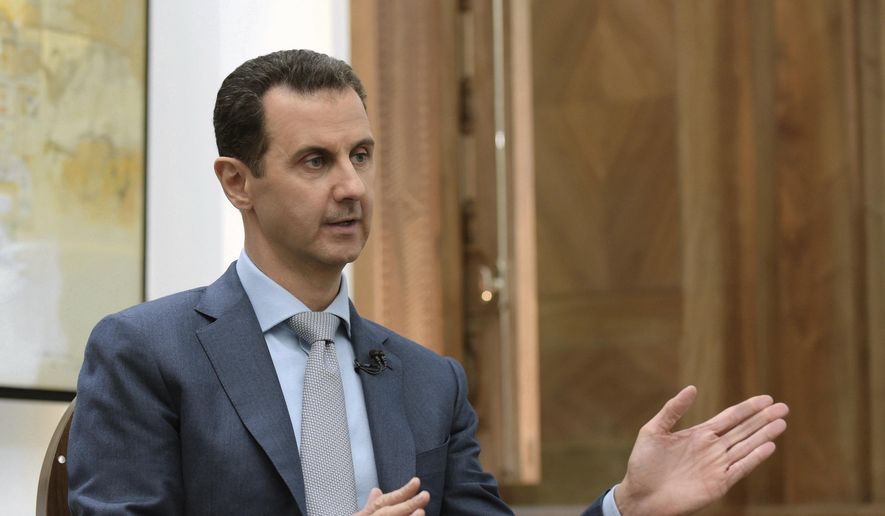President Trump’s decision to pull out of the Paris climate accord has now officially left the U.S. standing alone on the global stage, with Syria, the only other holdout, declaring Tuesday it will join the deal and commit to reducing its own greenhouse gas emissions.
The announcement comes at the same time a coalition of West Coast governors is attending a United Nations summit in lieu of the Trump administration, circumventing the White House and holding their own meetings with foreign leaders to craft strategies to fight climate change.
Taken together, the two moves underscore just how dramatically America’s position on climate change has shifted in less than two years. In December 2015, the Obama administration led the world in getting the Paris climate pact — the most sweeping global warming initiative in history — across the finish line.
Now, the U.S. is virtually the only nation on Earth to be on the outside looking in, giving critics yet another opportunity to cast the Trump White House as dangerously out of step on climate change, an issue that many countries are addressing with increased urgency.
“As if it wasn’t already crystal clear, every single other country in the world is moving forward together to tackle the climate crisis, while Donald Trump has isolated the United States on the world stage in an embarrassing and dangerous position,” Michael Brune, executive director of the Sierra Club, said in a statement Tuesday.
Syria’s participation comes just weeks after Nicaragua, another longtime holdout, also announced it would sign on to the agreement, which requires countries to cut pollution, promote clean energy, or take other steps designed at slowing global temperature rises.
Other international pariahs, such as Yemen, Iran and North Korea, also are signatories to the accord.
Like many other countries, Syria indicated it will be seeking foreign aid to help it meet its climate commitments. In a statement, officials said the fact that Syria has been torn apart by a long, bloody civil war should spur the rest of the world to contribute funds.
“Nations that are entering the phase of post-war recovery — as my nation has seen a war that was oppressive upon it — should be given the priority in reconstruction and reorganizing the environment and climate,” said M. Wadah Katmawi, Syria’s deputy minister of local administration and environment.
It’s unclear exactly what Syria will agree to do under the deal. The agreement is not legally binding and carries no penalties for non-compliance, meaning nations are free to do as much or as little as they want.
The U.S. had committed to cutting its emissions by at least 26 percent by 2025 when compared to 2025 levels, an extraordinarily ambitious target. China, by contrast, said only that it would cap emissions by 2030 and then begin reductions, meaning the country had to do virtually nothing for the next 13 years.
In June, Mr. Trump announced the U.S. would withdraw, citing, among other reasons, the disparity between America’s obligation and those of other countries.
Since then, the administration has maintained that it is open to re-entering the agreement under terms more favorable to the U.S., though there’s been virtually no sign that the White House or State Department is actively trying to renegotiate the arrangement.
“As the president previously stated, the United States is withdrawing unless we can re-enter on terms that are more favorable for our country,” White House spokesperson Lindsay Walters said late last month.
U.N. leaders are pushing the notion of solidarity even without American involvement.
“All over the world, vast numbers of people are suffering, bewildered by the forces ranged against them. Our job as leaders is to respond to the suffering with all means available to us,” said Fijian Prime Minister Frank Bainimarama, the president of the U.N. climate conference. “This means to meet our commitments in full, not back away from them.”
Meanwhile, the Trump administration has been shunned from international climate talks. French officials say Mr. Trump is not welcome at another round of climate talks in December, the BBC reported Tuesday, as European leaders reiterate their stance that by pulling out of the agreement the president has given up America’s seat at the table.
Instead, American governors are actively working with the international community in an unprecedented way.
The governors of California, Oregon and Washington, all Democrats, along with the environment minister of British Columbia, are in Germany this week for the climate talks. Those governments have formed what they call the Pacific Coast Collaborative and aim to meet emissions-reduction goals at their local levels. In the case of Oregon, California and Washington, they’re pursuing their goals with no support whatsoever from the Trump administration.
“The Trump Administration is forfeiting the United States’ role as the global leader in the fight against climate change,” Oregon Gov. Kate Brown said in a statement. “Participation in the Paris Agreement means moving toward a sustainable economy that creates jobs while reducing greenhouse gases at the same time. Oregon joins with Pacific Coast leaders to prepare for the clean energy economy of the future, not run away from it.”
• Ben Wolfgang can be reached at bwolfgang@washingtontimes.com.




Please read our comment policy before commenting.